Updated: January 31, 2025
To provide you with the most accurate and up-to-date cost figures, we gather information from a variety of pricing databases, licensed contractors, and industry experts.
If you like to spend time outdoors during the warmer months of the year, you may want to consider installing a pest control system to help you deal with insects like mosquitoes. Mosquito misting systems are a method of spraying mosquito pesticides in the form of thin mist and killing mosquitos and other insects and pests. It is one of the most effective and fastest-growing methods of controlling pests and insects around homes.
The national average cost of a mosquito misting system is between $1,800 and $3,000. Most people pay around $2,500 to install an automatic drum-based mosquito misting system with 30 nozzles. At the low end of the price range, you can spend $550 for a portable solar unit with 20 nozzles. At the higher end, you can spend up to $4,000 to install a high-end, app-controlled tankless system with 60 nozzles.
Mosquito Misting System Price
| Mosquito Misting System Cost | |
| National average cost | $2,500 |
| Average range | $1,800-$3,000 |
| Low-end | $550 |
| High-end | $4,000 |
What is a Mosquito Misting System?
According to the EPA, “Outdoor residential misting systems (sometimes called "mosquito misters") are application systems designed to spray pesticides in a fine mist to kill mosquitoes and other insects outdoors.” These systems have spray nozzles connected to a tank or another type of supply of insecticide. Mosquito misting systems are mounted around the area where the homeowners want to kill mosquitoes, such as the house, lawn, terrace, or another location. The system sprays mist when activated through a button or on preset intervals based on the settings you choose. Some systems use remote control or may be controlled using an app.
Mosquito Misting System Cost by Type of System
Depending on the type of mosquito misting system you have, you can expect to spend between $350 and $3,000 for a mosquito misting system. Based on how they are operated, there are automatic, remote, and solar misting systems. Each of them allows you to set when the system sprays the pesticide mist, which can be on a regular schedule or activated remotely via remote or a mobile app. Below is a table with the costs of each system.
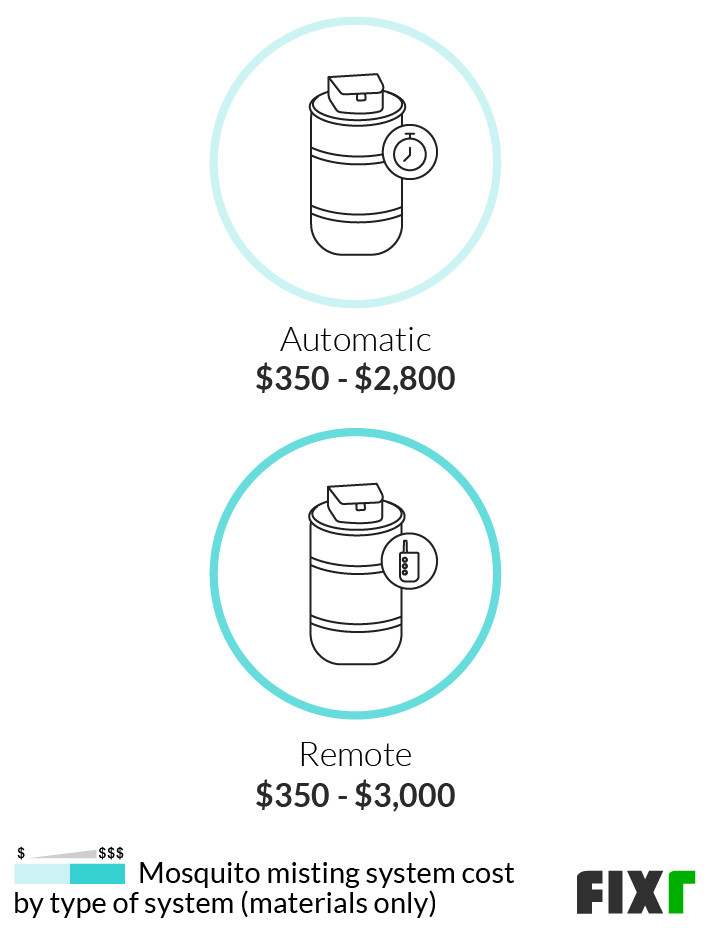

| Type | System (Materials Only) |
| Automatic | $350 - $2,800 |
| Remote | $350 - $3,000 |
Automatic Mosquito Misting System
Automatic misting systems cost $350 to $2,800. With an automatic mosquito misting system, everything is regulated and scheduled on your behalf. As soon as the system is up and running, it regularly sprays the insecticide on a set schedule. Usually, they have preset cycle options that spray the mist when pests and insects are most active. An automatic misting system means you will not have to worry about maintenance or adjust the controls. However, most models still have remote controlling features that allow you to spray the mist when you want.
Remote Mosquito Misting System
Remote mosquito misting systems cost between $350 and $3,000. In most cases, remote mosquito misting systems can both be set automatically and still come with manual remote controls or mobile app control, letting you operate and adjust the settings as desired. They can still spray automatically, based on the settings you apply, but it is up to you to change the schedule and make various adjustments over time.
Mosquito Misting System Cost by Storage Type
The cost of a mosquito misting system depends on the storage type and ranges between $350 and $3,000. In general, there are two basic types of mosquito misting systems: drum-based and tankless. Both operate in a similar way by funneling pesticide and water through tubing to strategically placed nozzles and spraying the pesticide around the perimeter of your property. The biggest difference between the two systems is that one is tankless, while the other uses a drum. Both are available as either automatic or remote. The table below shows price ranges for each type.
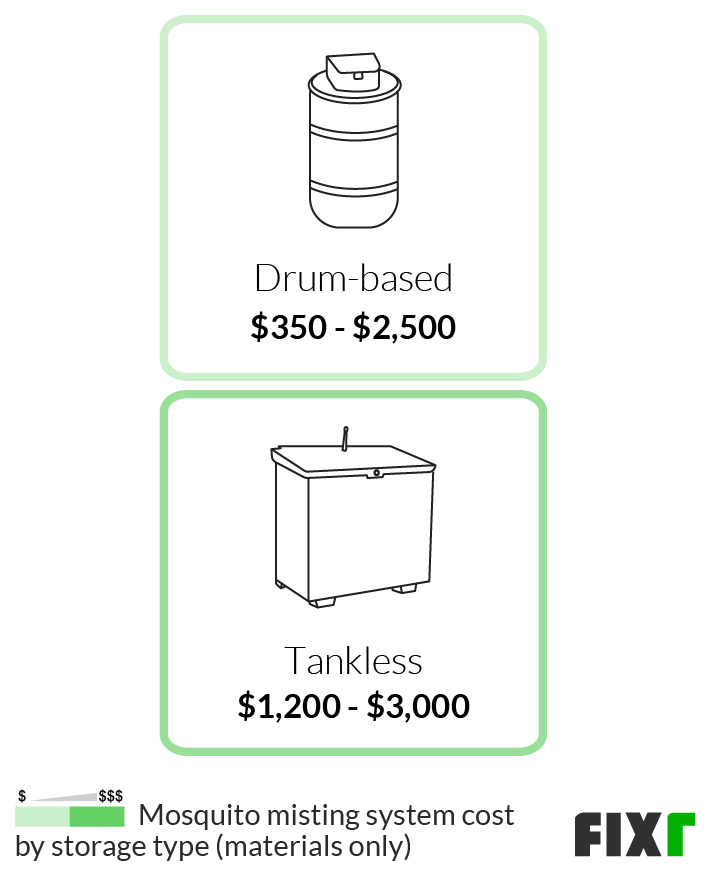
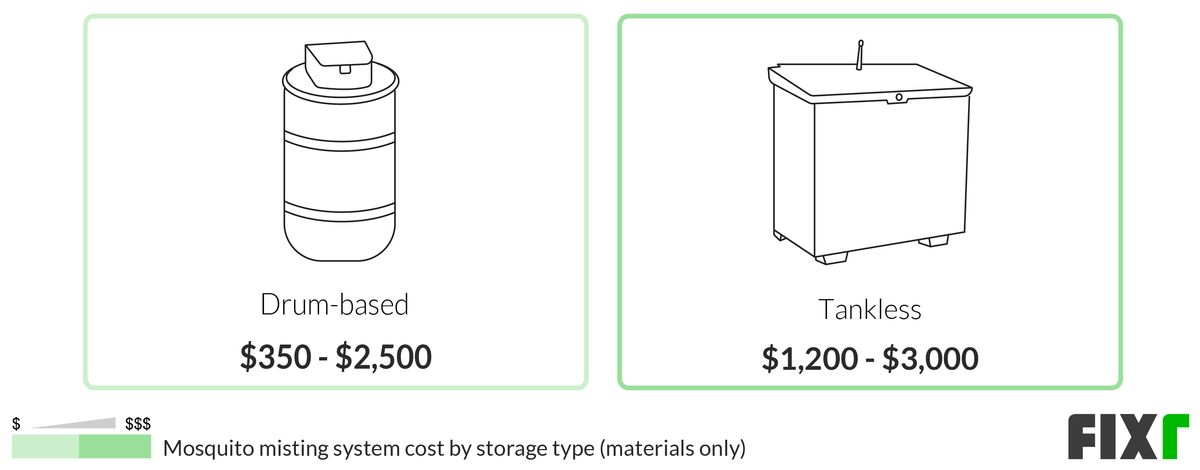
| Storage Type | System Cost (Materials Only) |
| Drum-Based | $350 - $2,500 |
| Tankless | $1,200 - $3,000 |
Drum-Based Mosquito Misting System
Drum-based mosquito misting systems are the cheapest option, costing between $350 and $2,500. The bigger price difference is because there are different sizes of drums, ranging from 12-gallons to 55-gallons. The drum or tank contains the mixture of insecticide and water, ready to be sprayed. The storage capacity of these models makes them bigger and bulkier overall, but it also means you do not have to worry about refilling them as often.
Tankless Mosquito Misting System
Tankless mosquito misters range in cost from $1,200 to $3,000. Unlike drum-based models, tankless misting systems do not have a large tank. Instead, they have a small container holding insecticide concentrate, which is then mixed with water and sprayed. The smaller nature of these systems means that they need to be refilled more often, but they are more compact and can be placed almost anywhere without taking up too much space.
Mosquito Misting System Cost by Brand
Based on the brand that manufactures or sells the mosquito misting system, your costs range between $350 and $3,000 for the system only. Whether you want a system you can install yourself or one you can have professionally installed, you have choices regarding which brand to use. Below is a table with a few top brands that offer mosquito misting systems for homeowners and their costs.
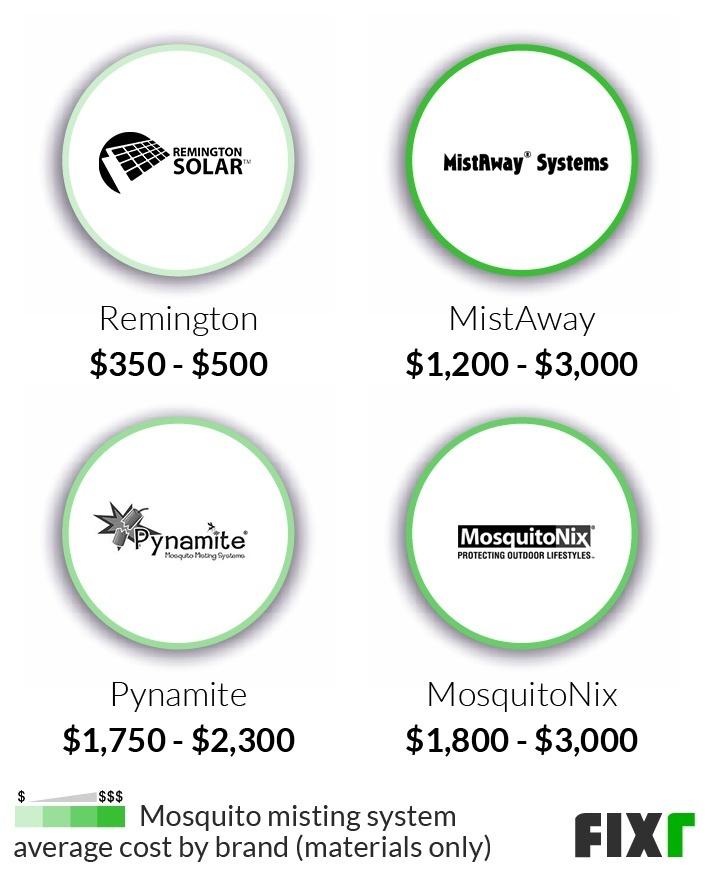

| Brand | System Cost (Materials Only) |
| Remington | $350 - $500 |
| MistAway | $1,200 - $3,000 |
| Pynamite | $1,750 - $2,300 |
| MosquitoNix | $1,800 - $3,000 |
Remington Solamist
Remington’s SolaMist costs $350 to $500. The company is popular for its solar-powered mosquito misting system Solamist. SolaMist is a portable 12-gallon reservoir system with 20 nozzles controlled remotely through a mobile app. The 16-watt solar panel is included in the package with an additional battery charging option. This system must be used with a SolaMist Pro concentrate or another SolaMist approved concentrate to operate properly.
Mistaway Mosquito System
The cost of a mosquito misting system by Mistaway ranges between $1,200 and $3,000. They are one of the most popular mosquito misting companies that sells two models of misting units: a Gen 1.3 Drum Unit and the more expensive Gen 3+ Tankless Unit. They also have two types of nozzles: structure nozzles installed on a fence, eave, or tree, and landscape nozzles that sit on top of the ground.
Pynamite Misting Systems
Pynamite’s mosquito misting system features an innovative technology called Cube that costs between $1,750 and $2,300. Instead of featuring a 55-gallon tank or drum, it is a 26-inch cube that fits the same amount of pesticide (55 gallons) that can mist up to 80 nozzles. The system also features an optional solar panel for homes where electrical power is not available. The misting cube connects via a Bluetooth programmable controller (mobile phone) and can be set to spray at specific intervals up to 24 times per day.
MosquitoNix Misting System
Homeowners can expect to spend between $1,800 and $3,000 for a misting system provided by MosquitoNix. One of the biggest advantages of using MosquitoNix is that it uses a natural, non-toxic solution that kills mosquitoes, flies, gnats/no-see-ums, fleas, ticks, and spiders while being safe for people and pets. They have locations throughout the Southern United States, including Alabama, Georgia, Florida, Texas, South Carolina, and others. All systems provided by them come with a lifetime warranty, servicing and maintenance, and a 100% satisfaction guarantee.
Labor Costs to Install a Mosquito Misting System
Labor costs of installing a mosquito misting system typically run from $200 to $1,000, with most homeowners paying $400 to $700 for a standard 30 nozzle system just in labor. Hourly rates are between $50 and $100 per hour, but contracts usually charge a fixed rate based on the size of the system rather than an hourly one. In most cases, a professional mosquito misting installation takes between 4 and 10 hours, depending on several factors, such as the size of your property, how difficult it is to run the tubing, the type, and the location of the nozzles.
Installation of a mosquito misting system is simple, and many homeowners choose to do the installation themselves. The process involves finding a location for the drum or intake system, providing water, and then running the tubing from the system out to the nozzles. Ideally, the nozzles should be positioned in discrete areas around the perimeter of your property. They may be tied off to fencing, trees, or parts of your home but not higher than 10 feet off the ground. Nozzles are held by fasteners and placed 10 to 15 feet apart. The professional will install the nozzles and tubing away from ponds and other aquatic features in the yard, such as koi ponds. The average yard uses 30 nozzles. However, you may need more or fewer depending on the shape of your yard and the area you are covering.
Mosquito Misting Nozzles
You can expect to spend between $1,800 and $3,000 for a standard system with 30 nozzles. Additional nozzles can be purchased for $5 to $20 each, but they may be cheaper purchased in sets. Regardless of what type of system you use, it will involve tubing to take the pesticide from the intake or drum to the nozzles, which propel the mist over your yard. The standard system includes roughly 30 nozzles, which should be placed 10 to 15 feet apart for maximum efficiency. However, large properties may need as many as 60 nozzles to cover the area adequately.
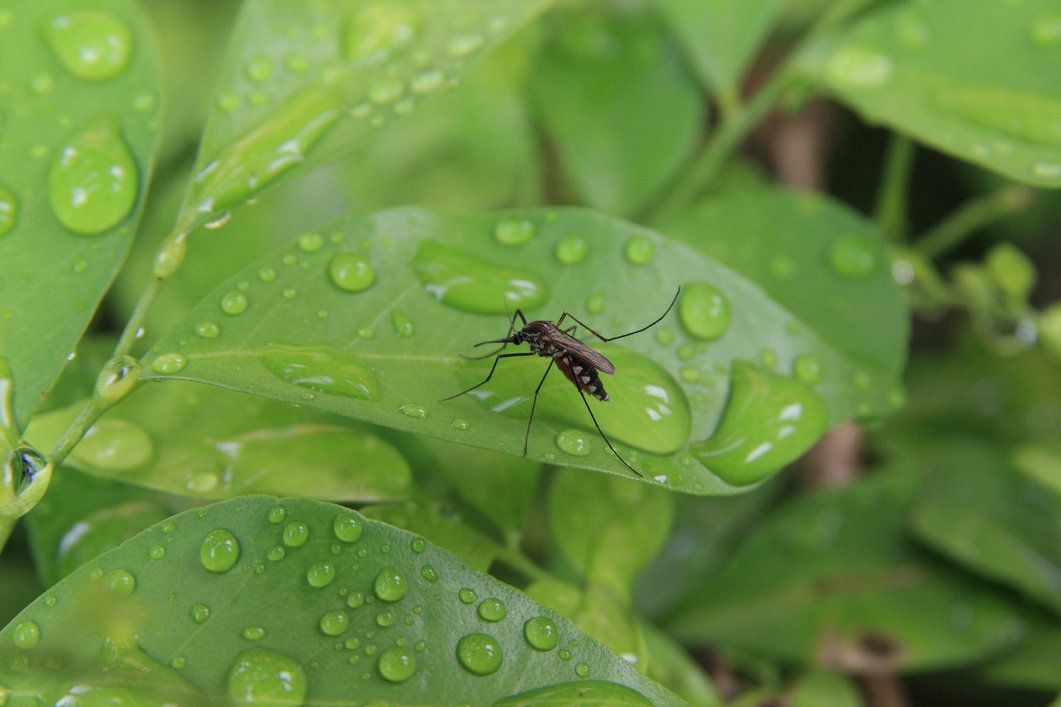
Mosquito Misting System Refill
Regardless of whether you buy a tankless or drum-based mosquito misting system, you also need to regularly purchase insecticide refills, which typically cost $70 to $150 per 64-oz bottle. Misting systems run twice a day in most cases, costing $2 to $3 per day for insecticide. The insecticide is the key ingredient in your mister, sprayed out to get rid of mosquitoes and keep your property free of other unwanted pests.
Refills are usually sold in 64 fl. oz. bottles, which is about the amount to fill up most 55-oz drum-based systems. There are different chemicals used in insecticide, with the most common one being Pyrethrin and Permethrin, which is considered safe for children and pets. The chemicals allowed for insecticide usage are regulated by the EPA to ensure they are environmentally friendly and safe.
Organic Mosquito Misting System
The cost of an organic mosquito misting system insecticide is $80 to $200 per half gallon. The difference between regular and organic misting systems is the type of insecticide used to spray and kill the mosquitoes. While regular insecticides contain organophosphate and synthetic insecticides, organic insecticides are made of non-toxic ingredients that do not emit potentially harmful or toxic chemicals that may put your home, pets, or the surrounding environment at risk. It can even help the local ecosystem thrive because many organic insecticides do not harm other insects like bees or butterflies. It is a good choice for people who grow their own fruits or veggies because you do not have to worry about toxic chemicals and pesticides getting on your plants.
Organic mosquito insecticides can also be used with regular mosquito misting systems. There are, however, a couple of downsides to organic treatments. They degrade quicker in the air than regular chemical-based insecticides, so you will have to spray more of it and more often. This means that you may have to spend more time refilling your mister and more money on organic refills.
Pros and Cons
Like many pest control systems, mosquito misting has positive and negative attributes. The system is fairly easy to set up and use and costs around $2 to $3 per day to run. The various pesticides used in the system are considered non-toxic. Some 100% natural solutions are available, allowing homeowners to get rid of unwanted insects without harming the environment, people, and pets. The system is fairly discrete and can be automatically or remotely controlled. Some systems are also easy to set up for DIY homeowners.
However, the system may not be very reliable since mosquitoes migrate frequently, requiring the system to be in constant operation. While pesticides are considered safe, there is always a chance of contaminating nearby water or plant life. Many of the pesticides used may kill aquatic life in nearby water. Regardless of the regular spraying intervals, the system may not be entirely effective. It is still recommended that homeowners take other steps to protect their properties from mosquitoes, including removing any standing water. Finally, no testing method goes hand in hand with the systems. This means that the system will continue to spray even if there are no mosquitoes or other pests in the vicinity.
Enhancement and Improvement Costs
Winterize Misting System
During winter, it is advisable to winterize your misting system, which usually costs between $50 and $100. The process usually involves emptying the system from the insecticide, rinsing it with water, and removing the water with an air compressor. The system should also be unplugged from any power source and checked for any remaining water. This is done to protect the equipment from the cold weather and prevent it from cracking due to the outdoor freezing temperatures. Winterizing is also beneficial against clogging and ensures the equipment works at full capacity.
Portable Mosquito Mister
Portable mosquito misting systems cost $700 to $2,500, depending on several factors such as the model, generator power, number of nozzles, and the water tank capacity. They usually come with a portable power generator that provides the power for the nozzles. Some models can also be battery-powered. They are a convenient solution for traveling but are usually limited in the area they cover.
Solar Mosquito Misting System
Solar misting systems are a newer technology that costs $350 to $500. As their name suggests, solar mosquito misting systems are not powered by electricity, generators, or batteries but rather solar power. Most models also have an alternative power source for when there is no sun. They are usually drum-based systems with a portable tank holding a certain amount of pesticide.
Additional Considerations and Costs
- Safeness. Mosquito misting systems are considered safe and non-toxic for people, children, and pets.
- Warranty. Many systems have a limited warranty that lasts anywhere from 1 to 5 years. Always check at the time of purchase to determine what is covered.
- Timing. Many professionals suggest that the system only be used around the times you plan to use your yard. This limits the potentially harmful effects of the insecticide on bees or butterflies and other benign insects.
- Environmental impact. Mosquito misting kills other insects, including wasps and some beneficial insects such as bees. So, it is important to use the system as sparingly as possible.
- DIY. Many mosquito misting systems are simple and easy to install. They can be a DIY project. To do this, you would need a misting installation kit and plan where the nozzles and tubing would be positioned beforehand for maximum efficiency.
FAQs
- What is the average cost of a mosquito misting system?
Costs vary depending on the type and size of the system and installation. Most people pay around $2,500 for a 30-nozzle system.
- Do mosquito misting systems really work?
Mosquito misting systems as a part of a mosquito-control protocol can reduce the number of insects in the area.
- How much water do patio misters use?
Patio misters use between ½ to 1½ gallons of water per hour.
- Do misters work in humid climates?
Yes, misters work in humid climates. However, they should not be used in the rain, below 50ºF (10ºC), or in high wind conditions.
- How high should misters be?
Misters should be no more than 10 feet off the ground for best results.
- How do you keep misters from clogging?
Nozzles may clog if you have hard water, which can leave deposits behind. Soak the nozzles in white vinegar to remove the deposits.
- Are mosquito misting systems safe?
The pesticides sprayed from misting systems hold into the air for a brief period. Short-term exposure is safe for humans. However, it is recommended to use safety equipment if you will be exposed to pesticides long-term.
